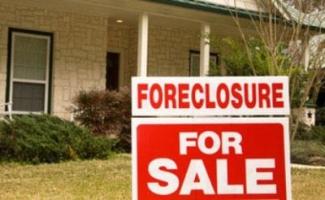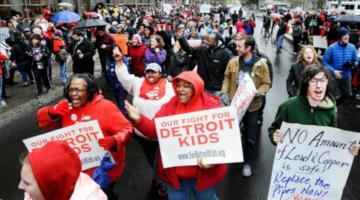Corporate America and white supremacists have waged merciless war against the Black megapolis that dared to nurture revolutionaries and great music.
“For more than 15 years mass water shutoffs were contributing to the spread of a variety of illnesses in largely black neighborhoods.”
After COVID-19 ripped open one of capitalism’s infected scars, both horrific death and mass awareness of the abject failure of the U.S. health-care system oozed dialectically from the wound. Detroit in particular suffered extraordinary agony when the coronavirus beast charged through a gate opened by government officials, and after baring its fangs embarked on a seemingly endless rampage of infection, death and destruction of people with dark skin.
The statistics are staggering. Only 14 percent of Michigan’s residents are of African ancestry, but they account for more than 40 percent of coronavirus deaths in the state. Detroit is nearly 80 percent black. While its residents comprise only 7 percent of the state’s population, 26 percent of Michigan’s COVID-19 infections are found there.
This disaster was waiting to happen in a city where 37 percent of the population lives in poverty. Physical health often corresponds with financial health, and in Detroit, many people were already struggling with diabetes, heart disease, asthma, hypertension and assorted autoimmune diseases. COVID-19 set free in such a community was certain to wreak havoc, particularly if testing and treatment were hard to come by.
“Only 14 percent of Michigan’s residents are of African ancestry, but they account for more than 40 percent of coronavirus deaths in the state.”
It wasn’t always this way. There was a time when Detroit was the Promised Land. In the 1940s my late uncle Frank Pitts packed up and left rural Alabama to find work and prosperity in the Motor City. There were many thousands just like him who were part of one of the great migrations from the South to a place where the auto industry helped give birth to not only a stable black middle-class but also innovative cultural and commercial enterprises, most notably Motown Records. The city provided a nurturing environment for revolutionaries like Malcolm X and Chokwe Lumumba, as well as organizations like the Nation of Islam, the Republic of New Afrika, the Dodge Revolutionary Union Movement, and the Shrine of the Black Madonna.
In 1974 the Detroit experience became even sweeter when Coleman A. Young became the first black mayor and struck fear into many a racist heart. As he faced his enemies down with a straight back and a profane tongue, he was simultaneously granting the black community unprecedented access to government positions and contracts. As whites continued to flee to the suburbs, they concocted an enduring demonizing mythology about Young that characterized him as a hateful incompetent who was single-handedly responsible for driving the city into poverty. In 2018, the myth was at long last debunked by the Detroit Free Press, which conducted an objective, scholarly study that concluded: “If all mayors had shown Young’s fiscal discipline, Detroit likely could have avoided bankruptcy…[He] handled Detroit’s money better than virtually every other mayor from 1950 to 2014.”
“Whites characterized Mayor Young as a hateful incompetent who was single-handedly responsible for driving the city into poverty.”
But while Young can’t be credibly charged with incompetence, he and his community demonstrated the revolutionary potential of African people, and that sparked a protracted campaign of resentful warfare by capitalist and racist forces against Black Detroit. That war weakened them, diminished their ability to fight back and ultimately drove the city into a state of political and economic despair. Over the course of decades, Detroit was to become the target of city-wide redlining, a state government takeover of the school system, an “emergency manager” with license to usurp all authority of elected officials, unlawful tax foreclosures on a mass scale, mass water shutoffs, a municipal bankruptcy, and a general population purge to lay the groundwork for wholesale gentrification of the city that is now underway with a vengeance. Black Detroit is proud and resilient, but these events and more drove too many of Detroit’s Africans into poverty and left them vulnerable to the horrors of COVID-19.
All of these actions are disturbing, but the water department’s use of mass water shutoffs as a collection strategy is an attack on Black Detroit that is directly related to the city’s coronavirus problem. A very large segment of the population is simply unable to pay market rates for water service. For more than 15 years Detroit’s poor and their advocates have struggled to end the shutoffs and to urge the adoption of a water affordability plan that will index actual household income to fees for water service on a sliding scale. Those efforts intensified in 2014, when the city drastically increased shutoffs as part of the municipal bankruptcy process. In the years since then, more than 140,000 homes lost water service. When the coronavirus arrived, many of these households were simply unable to follow the oft-repeated directions to engage in regular handwashing.
The concern about water shutoffs and disease long predated the arrival of COVID-19. People knew that without water, disease thrives. “We’ve known that at least since the cholera outbreaks in London in 1854,” said Dr. Mona Hannah-Attisha, a pediatrician who helped expose the lead contamination of Flint’s water. “We need water to keep our hands and bodies clean, to prevent the spread of infectious diseases.”
“The water department’s mass shutoffs is an attack on Black Detroit that is directly related to the city’s coronavirus problem.”
Nevertheless, public officials feigned ignorance and persisted in shutting off water service with wild abandon, leaving thousands of people to get their water by filling buckets from relatives’ taps, seeking bottled water from support organizations, and collecting rainwater and melted snow in trash cans and barrels.
The agitation against this madness has been constant. Grassroots activists have used every conceivable tactic. In addition, I was part of a team of lawyers that litigated a class action lawsuit challenging the shutoffs all the way to the Sixth Circuit Court of Appeals where that court said it could not tell a city in bankruptcy how to manage its fiscal affairs, and that even if it could, the judges didn’t believe that people have a fundamental right to water. Last summer, in frustration and desperation, members of this legal team filed a petition with the Michigan Department of Health and Human Services that proposed the declaration of a public health emergency in Detroit and a moratorium on water shutoffs. State government was approached because talking to Detroit officials about this issue was like talking to a brick wall.
In addition to references to scientific studies that demonstrated a correlation between the lack of water and the spread of disease, the petition also emphasized that water is a necessity of life, and without water for drinking, cooking, cleaning and bathing, people are certain to become ill and eventually die, regardless of whether they become infected by bacteria or a virus. The petition was denied on grounds that it showed no “causal association between water shutoffs and water-borne disease.” The petition’s assertion that water is a necessity of life was ignored completely.
“The judges didn’t believe that people have a fundamental right to water.”
We then went directly to Governor Gretchen Whitmer and requested that she overrule the Michigan Department of Health and Human Services. Months passed without a formal response, and when a response was finally received on February 21st from the Governor’s lawyer, it stated there was “insufficient data to support the use of emergency powers in this instance.” At the time, the coronavirus had not yet found its way into Michigan. Yet, on March 9th, a mere two weeks after Michigan state government claimed there was no connection between disease and water shutoffs, and immediately after COVID-19 was first regarded as a threat to Michigan, the Governor and Detroit Mayor Mike Duggan announced water shutoffs would end, and interrupted service would be restored. It was too little too late, and we shudder at the thought that but for activists’ agitation about the water issue in the days leading up to the pandemic, the general disregard for the plight of Black Detroit might have meant water shutoffs would have been ignored until much later, and with even more tragic consequences.
There are continuing complaints that water service has not been restored for everyone and that an unfair, unreasonable burden has been placed on poor families to make arrangements for reconnection. There are even unconfirmed rumors that water shutoffs continue. But of greater significance is the fact that for more than 15 years when mass water shutoffs were contributing to the spread of a variety of illnesses in largely black neighborhoods, local and state government officials refused to acknowledge the city’s health emergency. If these officials have anything resembling a conscience and any concern at all about God’s judgment, they will ask themselves why water shutoffs became an emergency only after they realized mass coronavirus infection in Black Detroit would certainly impact both the gentrified parts of town and the white suburbs.
Mark P. Fancher is an attorney and longtime writer for Black Agenda Report. His views are not necessarily those of organizations with which he is affiliated. He can be contacted at mfancher[at]comcast.net.
COMMENTS?
Please join the conversation on Black Agenda Report's Facebook page at http://facebook.com/blackagendareport
Or, you can comment by emailing us at comments@blackagendareport.com













